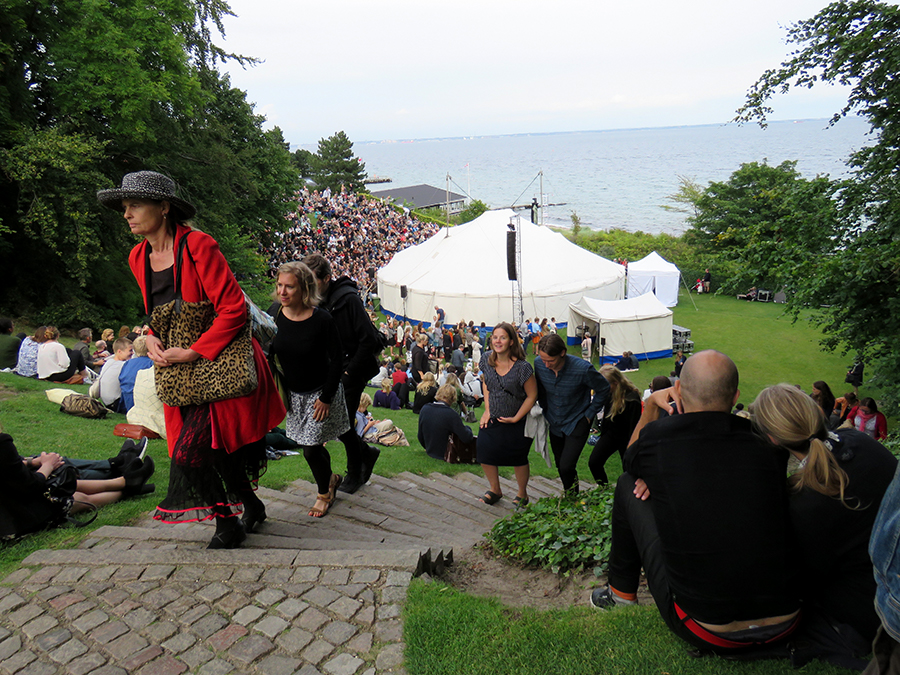Lundagard reporter Evan Farbstein makes a few observations about the writers who spoke at the Louisiana Literature Festival (24-27 August) and self expression, as compared to self-absorption, in literature.
HUMLEBAEK, DENMARK: In a crowded, perfectly square room at the Louisiana Museum, Zadie Smith talks about self-obsession:
– I do believe in evil; I just think that evil is mostly solipsism*, says Zadie Smith.
Zadie Smith was one of the headliners of this year’s Louisiana Literature Festival, joined by Paul Auster, Siri Hustvedt, Linda Boström Knausgaard, 2015 Nobel Prize for Literature recipient Svetlana Alexievich, and the French literary wunderkind Edouard Louis.
It may seem strange to describe authors as “headliners,” or to think of literary discussions in festival terms. But the experience I had when I walked into the complex of buildings that houses the Louisiana Museum was actually quite similar to the experience of walking into a music festival – albeit one where the crowd demographics were more the type of people you’d find at a public library than an Avicii concert. There were four stages, the largest, Parkscenen, which was a grey canvas tent on a grassy clearing overlooking the Oresund. The day was not a summer-like one, with the sky marbled in white and grey cloud cover and the temperature oppressively, steamily warm.
If evil is solipsism, is solipsism evil? A recent trend in literature is “autofiction” – heavily autobiographical, confessional near-memoirs, sometimes fictionalized only in changed names and locations. Like all artistic trends, this one is imitating life: the current generation’s life consumed by self-presentation, with near-constant social media opportunities to primp and prepare and compare oneself.
An hour before Zadie Smith, Edouard Louis had spoken at Parkscenen. At the age of 22 Louis published his first novel, The End of Eddy, an autobiographical account (in interviews, he’s claimed that everything that happened in the novel actually happened to him) of growing up gay and poor in rural France. His second novel, out last year, also draws heavily from his own life. If the writer’s main subject is his own experience, are we to think of this as solipsism? Or simply self-expression?”
Another writer whose work frequently draws the same sorts of questions from critics is Karl Ove Knausgaard, the brooding Norwegian whose six-volume autobiographical novel, My Struggle, expresses in minute – some say trivial – detail the inner machinations of a mind constantly at war with itself. His work has received criticism for being narcissistic, an exemplar of a generation that has become increasingly obsessed with everything self – self-involving, self-expressing, self-presenting. Nonetheless, he’s one of the most popular European writers of literary “fiction” in recent years.
When Siri Husvedt and Paul Auster (whose own 2012 Winter Journal is heavily autobiographical) were in conversation at Parkscenen, they were asked what made some fiction special. Auster posited it was relatability, the reader finding herself in the writing. Hustvedt went on to talk about how to achieve relatable writing. She said that writing is “remembering what never happened,” citing the importance of emotional, rather than factual, truth.
So how to walk the line between Zadie Smith’s “evil” self-absorption and the type of relatable, beneficial self-divulsion that Paul Auster and Siri Hustvedt believe is required of making relatable fiction? That’s left up to the reader to determine. If, as Hustvedt said, writing fiction is remembering, not creating, then perhaps when we read it’s also a function of memory – remembering one’s own thoughts and feelings in the writing. And if this generation really is more self-absorbed than previous ones, it would make sense that we prefer our literature to be the same.
*Solipsism: a term from philosophy which describes the idea that the self is the only thing that exists, often used to describe a certain type of selfishness.










